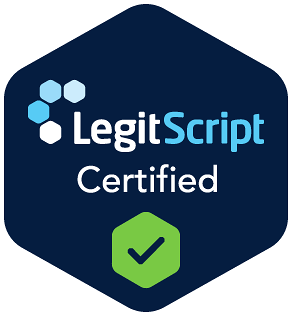Anxiety happens when your body reacts to stress or something it sees as a threat. It can feel like worry, fear, or nervousness. Everyone experiences anxiety from time to time. But for some, anxiety becomes overwhelming and constant. A normal reaction in the body becomes a debilitating condition.

Anxiety disorders are more than temporary worry — they cause persistent distress that affects everyday activities and social connections. Some anxiety disorders have a clear cause, such as trauma or a major life event. Others may develop without warning and become long-term, such as in individuals with post-traumatic stress disorder (PTSD).
Anxiety can also be caused by genetics, brain chemistry, or ongoing stress. Sometimes, substance use or withdrawal can make anxiety worse. That’s why at Amity San Diego, we treat both mental health and substance use together. Our anxiety and addiction treatment program supports the whole person as they recover physically, mentally, and spiritually.
Types of Anxiety Disorders
- Generalized Anxiety Disorder (GAD): Ongoing worry about everyday things like work, health, or relationships, even when there’s no clear reason.
- Panic Disorder: Sudden, repeated panic attacks with chest pain, rapid heartbeat, or dizziness that feel like a heart attack.
- Social Anxiety Disorder: Intense fear of being judged or embarrassed in social settings, which can lead to extreme avoidance.
- Specific Phobias: Extreme fear of certain things or situations (like flying or spiders) even if they pose little real danger.
- Obsessive-Compulsive Disorder (OCD): Persistence of unwanted thoughts (obsessions) and repetitive behaviors (compulsions) meant to ease anxiety.
- Separation Anxiety Disorder: Intense fear of being away from loved ones, often seen in children but also adults.
- Post-Traumatic Stress Disorder (PTSD): Lasting anxiety after a traumatic event, often involving flashbacks, nightmares, or constant fear.
Each anxiety disorder requires a tailored approach to treatment. Anxiety disorders can develop gradually or suddenly. Each person’s experience with anxiety disorders can be very different.
How Does Anxiety Interact with Addiction?
Signs of addiction include:
- Needing larger amounts of a substance to feel the same effect
- Feeling that they “need” substances to cope with stress or emotions
- Avoiding responsibilities
- Strong cravings or urges
- Withdrawal symptoms when not using
- Losing interest in hobbies, work, or relationships
- Lying or hiding substance use from loved ones
- Using substances even when it causes health or legal problems
- Feeling unable to stop using substances, even if they want to quit
- Taking risks while under the influence, such as driving or unsafe sex
- Feeling depressed, anxious, or irritable when not using
These signs can worsen anxiety, especially when someone feels guilt, shame, or fear. Going through repeated use and withdrawal puts extra pressure on both the mind and body. Addiction often hides deeper pain or unresolved trauma. At Amity San Diego, we understand that addiction is not a failure, but a health issue.
What is Dual Diagnosis Treatment?
Treatment for dual diagnosis often includes therapy, medications, and group support. Therapists help the person understand their anxiety and addiction triggers. Medications help balance brain chemistry, easing symptoms and reducing cravings. Support groups provide encouragement and connection with others who are facing similar challenges.
Effective treatment for anxiety and addiction focuses on healing both the mind and body. It includes:
- Integrated Therapy: Combining addiction recovery with mental health counseling.
- Medication Management: Using safe, effective medication when needed.
- Lifestyle Changes: Encouraging healthy habits like exercise, nutrition, and stress management.
- Support Networks: Connecting with peers and professionals for ongoing guidance.
Dual diagnosis treatment helps individuals regain control, reduce anxiety, and build a healthier future. At Amity San Diego, our anxiety and addiction treatment program uses dual diagnosis care to help people recover from addiction with compassion, structure, and support every step of the way.
Benefits of Dual Diagnosis Treatment
Many people with dual diagnosis face complex challenges. Mental health symptoms can make it harder to stop using substances, because the addicted person may think they’re the most effective way to cope with their symptoms. At the same time, substance use can sometimes worsen negative feelings tied to mental health problems. Without care that addresses both issues together, breaking the cycle is very hard.
Dual diagnosis treatment provides a safe environment where both issues can be addressed at once. It blends different treatments, medicines, and therapy plans tailored to protect the individual. This helps patients understand their triggers and develop new, healthier ways to cope.
Here are some important advantages of dual diagnosis treatment:
- Whole-Person Care: Addresses both mental health and addiction at the same time, providing insight into how they overlap.
- Improved Mental Clarity: Therapy and guidance from professionals can ease symptoms like anxiety and mood swings.
- Healthier Coping Skills: People can learn how to handle stress and emotions without the aid of substances.
- Personalized Treatment: Plans are based on each person’s unique needs, challenges, and goals.
- Better Long-Term Outcomes: Treating both conditions can lead to stronger recovery and improved quality of life.
- Stronger Support System: Specialized treatment can build trust with professionals and peers who understand the challenges of recovery.
Dual diagnosis treatment offers a path to recovery that considers the full picture of a person’s struggles. It supports individuals in finding balance, rebuilding relationships, and living healthier lives. With the right help, healing is possible.

Is Dual Diagnosis Treatment Right for You?
You might need dual diagnosis treatment if your substance use seems to make your mental health worse. This specialized form of addiction treatment helps break that harmful cycle with personalized care and proven therapies.
However, dual diagnosis treatment isn’t the right fit for everyone. If you only have substance use problems without mental health concerns, a focused addiction program may be better for your needs. If you only have mental health issues without substance use, therapy or medication focusing on those concerns might be best.
A professional evaluation can help figure out the best approach for your needs. Talking honestly with a counselor or doctor can guide you toward the right care. Remember, reaching out is a brave step toward healing and growth.
Find Anxiety and Addiction Recovery at Amity San Diego
At Amity San Diego, we provide person-centered treatment that meets you where you are. Our anxiety and addiction treatment program is designed to treat both conditions at the same time. This approach helps reduce relapse and supports long-term recovery.
We understand that anxiety and addiction affect people differently, so we never use a one-size-fits-all plan. We build treatment plans around your unique needs, challenges, and goals. We combine evidence-based therapies with a calm, supportive setting where healing feels possible.
Recovery is not just about stopping substance use. It’s about finding peace, building confidence, and learning how to cope in healthy ways. At Amity San Diego, we walk beside you with compassion, respect, and expert care. Reach out to us today to begin your path to healing and lasting change.
Verify Your Insurance
We understand that navigating the financial aspects of treatment can be challenging. Amity San Diego is here to help. Our team works with many insurance providers to make treatment as accessible as possible. Click below to verify your insurance and learn more about your coverage options. Our admissions team will guide you through the process and answer any questions you may have.








